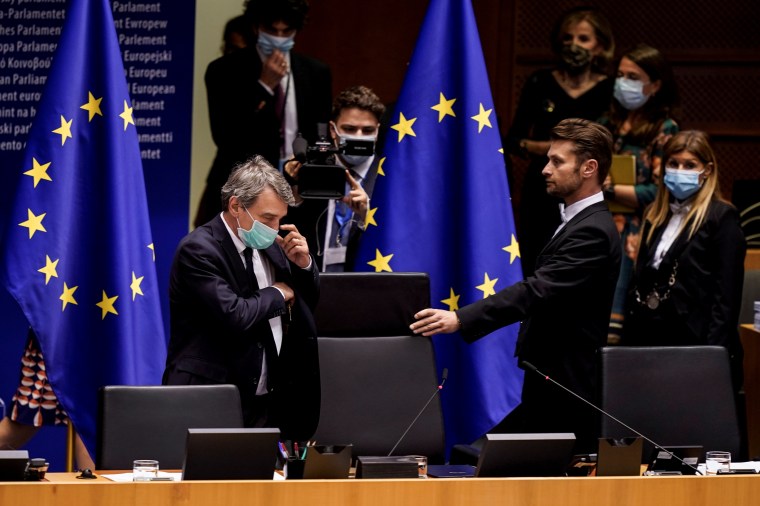Eszter Zalan is a correspondent for the Brussels-based EUobserver. She covered conflict and war zones for Népszabadság, the now-shuttered Hungarian daily, for several years, and covered Hungary for Agence France-Presse, before joining EUobserver in 2015. Recently, she has reported on EU affairs, including Brexit, Hungary, and the ongoing coronavirus pandemic.
CPJ spoke with Zalan via email on June 9 about how she sees the impact of coronavirus on reporting in the EU, and how illiberalism, disinformation, and economic crisis play a role. Her answers have been edited for length and clarity.
Coronavirus hit journalists around the world pretty hard. What have been the day-to-day changes for journalists reporting on the EU?
A lot of EU journalism comes down to meeting sources for coffees, bustling on the sidelines of council meetings, chatting up diplomats at receptions, quizzing fellow journalists about their country’s position. A lot of it is informal and in person. All that came to a halt with the introduction of the lockdown measures. With video conferences becoming the new norm, a lot of the officials and diplomats had also been left in the dark, so it has become more difficult and time-consuming to gather information. The EU institutions have been relatively quick to introduce online press conferences, although it took considerably more time to find formats allowing questions to be asked in real time, and it can never replace the real thing.
Now that lockdown measures have been easing, there is no rush back to personal press conferences. The new reality will likely lead to some conflicts between reporters and the institutions as social distancing rules do not allow the usual hundreds of journalists to return to press events at the same time, so there could be some sort of limit in numbers or rotation.

How are media outlets in the EU faring economically and how do you see the situation evolving?
Advertisement revenues have been in free fall, and many online advertisers—brands—have refused to put their ads next to content about the coronavirus pandemic. So despite the massive public interest and the spike in readership in the early weeks of the pandemic, most media outlets have suffered. There have been cuts in staff and salaries across Europe, creating an extra mental burden on journalists who worked extensively throughout the pandemic with all its anxieties.
We are seeing that disinformation is a major obstacle to EU citizens being able to access reliable information. How is disinformation changing in relation to the epidemic and what is the best way to fight it?
As journalists, our best way to fight it is by continuing to report the facts accurately. The social media ecosystem does not help when an article which has been researched, edited, and checked against journalistic standards looks the same and has the same weight on our news feed as an opinion by John or Jane Doe. I hope that the pandemic showed readers and citizens the importance of media literacy, and knowing a little bit about finding sources you trust because they report the facts. I also hope it highlighted the importance of having access to trustworthy information, independent media, and having authorities that communicate in an authentic way.
You are Hungarian. Critics say Hungarian Prime Minister Viktor Orbán has threatened to use the pandemic to consolidate power in what many call his illiberal democracy. What are the long-term implications for journalists in Hungary and in the region?
The financial and political pressure on independent Hungarian journalists, and the centralization of media by the government and its allies did not start with the pandemic.
The emergency measures introduced during the pandemic allow prison terms of up to five years for those who spread falsehoods or distorted facts that could alarm the public, or hamper the successful management of the pandemic.
Journalists have not been targeted so far under these rules. There had been several investigations opened for alleged scaremongering, some launched because of online posts promoting false information about the pandemic. There have also been reports of two citizens arrested for Facebook posts critical of the government. This could have a chilling effect in the country, where some health care professionals had already been afraid to publicly disclose information on the health crisis, partly out of fear of making involuntary mistakes. The long-term effects will be a further marginalizing of independent journalism, eroding fact-based reality and decision-making, and greater space for propaganda.
Have EU institutions done enough to respond to some of these major threats to journalism—access, funding, disinformation, and authoritarianism?
I think the European Commission and Council of the European Union could do more in helping to reinforce the legal climate in EU countries to protect journalists, and call out or scrutinize member states that adopt legislation that could be used to threaten or silence journalists. The European Commission could also be more active in confronting disinformation or misinformation spread by EU governments. It could do more by proposing legislation to better protect journalists against online and offline abuse and against Strategic Lawsuits Against Public Participation. [Also known as SLAPPs, these are lawsuits aimed to censor defendants through burdensome and expensive court processes.] The EU institutions themselves could also be more transparent with journalists—that would help.
Press freedom worldwide is looking more precarious than ever. With old and new superpowers failing to defend journalists, is the EU taking a lead internationally on press freedom?
It is true that European journalists, in general, have better legal protection, financial stability, and opportunities than colleagues in other parts of the world. But let’s not forget that in recent years two European journalists have been murdered in EU member states, and with the economic crisis and illiberal governance taken hold in some countries, I would hesitate to say that Europe or the EU itself is a vanguard in championing press freedom.
